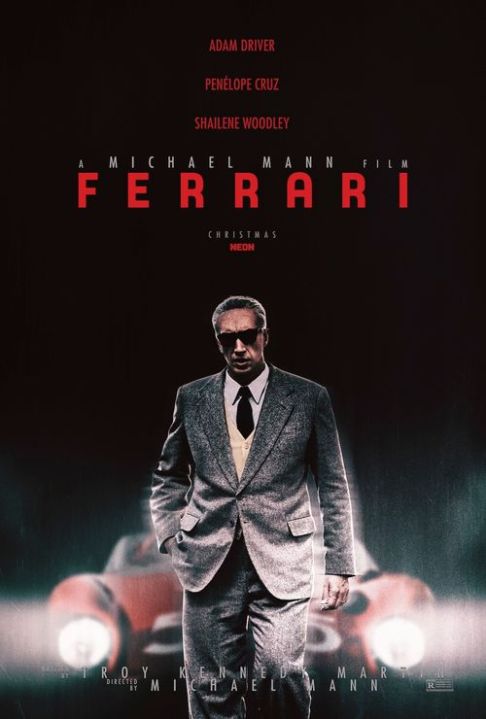
(NEXSTAR) — At its core, “Ferrari,” the new ultra-slick, high-octane sports biopic from “Heat” director Michael Mann, is a portrait of the different ways we process grief. And while the film, which hits U.S. theaters Christmas Day, delivers the action it promises, that’s not really what it seems to care about the most.
“Ferrari” stars Adam Driver (“Marriage Story”) in his second Italian dynasty biopic, following his well-received performance in 2021’s “House of Gucci.” Here, Driver portrays entrepreneur Enzo Ferrari, who, despite having founded one of Europe’s most illustrious car manufacturers finds himself nearly flat broke and being eclipsed by new competition.
What’s more — his family is falling apart.
It’s 1957. It’s been just a year since the death of Dino, Ferrari’s son with wife Laura, and neither parent is handling the anniversary well. Academy Award winner Penelope Cruz (“Vicky Cristina Barcelona”) — also in her second Italian dynasty biography, following her role as designer Donatella Versace in “The Assassination of Gianni Versace: American Crime Story” — plays Laura, who’s at war with the resentment she’s carrying against Enzo.
Cruz takes viewers through Laura’s shock of discovering betrayal, in the form of Enzo’s longtime mistress (Shailene Woodley, “Dumb Money”), and the secret son he shares with her. Unfortunately for Enzo, this discovery happens just as he needs Laura’s sign-off to keep Ferrari afloat.
What follows is a series of battles — Enzo’s relentless (possibly even ruthless) drive to keep Ferraris at the front of the racing pack and Laura’s vindictive (though understandable) rampage against her husband. Enzo and Laura’s post-Dino lives pose the very real question: When you lose the most important thing to you, what do you replace it with?
“Ferrari” marks director Mann’s first film since 2015’s “Blackhat,” which received mixed reviews and dramatically underperformed at the box office. Mann recently acknowledged the film’s failings to Variety, blaming himself and saying “The script was not ready to shoot.” The release of “Ferrari” brings good news for Mann fans: barring a focal wrong turn (which we’ll get to), “Ferrari” is a return to form for Mann, who received acclaim for his “Best Picture”-nominated “The Insider” back in 2000.
Mann’s latest feels like a marriage of his more “serious” prestige dramas (“The Insider” and “Ali”) with the action-thrillers he helmed throughout the 2000s (“Collateral” and “Miami Vice”). And while this synthetic direction is mostly successful, the film’s much-anticipated racing sequence derails some of the movie’s drive.
The race unfortunately feels like a distraction from the story that’s been established up until that point. Many viewers may be surprised that a furious race in Italian luxury sports cars across Europe is the least interesting stretch of “Ferrari,” but it’s oddly when the film feels like it runs out of gas.
Because while Enzo’s unrelenting pursuit of survival and reputation drive the movie toward a disastrous and tragic race, ultimately the 1957 Mille Miglia doesn’t full speak to the emotional journey we’ve established for Enzo beforehand. Now, it would be illogical for such a visual medium as a movie to not feature Ferrari racing in a movie about the man who founded Ferrari — but it feels like that is the movie wanting to be made here.
Warning: spoilers (that are easily known through real life) ahead.
The Mille Miglia race ends with a Ferrari driver losing control of his vehicle and crashing into and killing 10 spectators — including five children.
While this could have worked as a way of forcing Enzo to face his own ill-placed motivation and arrogance, it doesn’t. The audience is ultimately left wondering what — if anything — the tragedy means to Enzo. Ambiguity in art is fine, but the film’s ambivalence about how this relates to Enzo’s grief over Dino undercuts the entire arc.
One could argue that the loss of Dino isn’t the sole focus of the movie and while that is true, the film is bookended by scenes related to the late Ferrari son — not to mention the film’s true climax directly involves Laura’s resentment over Enzo’s failure to “save” Dino and concern that Enzo’s younger son has replaced the Dino-shaped hole in Enzo’s life.
It all ends up being a muddled completion of an otherwise compelling and successful family drama.
The top-line takeaways: Mann’s direction is as good as it’s ever been and dazzles against the lush cinematography of Erik Messerschmidt (“Mank,” “The Killer”). As 2023 has been a strong movie year, Driver and Cruz could ultimately be left out of Oscar conversations. In a year with fewer stellar performances, however, the stars would be a lock for nomination.
The film has so far received mixed reviews, though it should be noted it’s received some pretty high caliber raves. Most recently, the National Board of Review named it among its Top Films of 2023. It currently holds a 74% Tomatometer score on Rotten Tomatoes, accounting for 69 critical reviews.
“Ferrari” is rated R and has a runtime of 2 hours and 10 minutes. Despite its ultimate anti-climatic resolution, “Ferrari” is still well worth the ride.
Score: ★★★☆☆
Suggest a Correction

